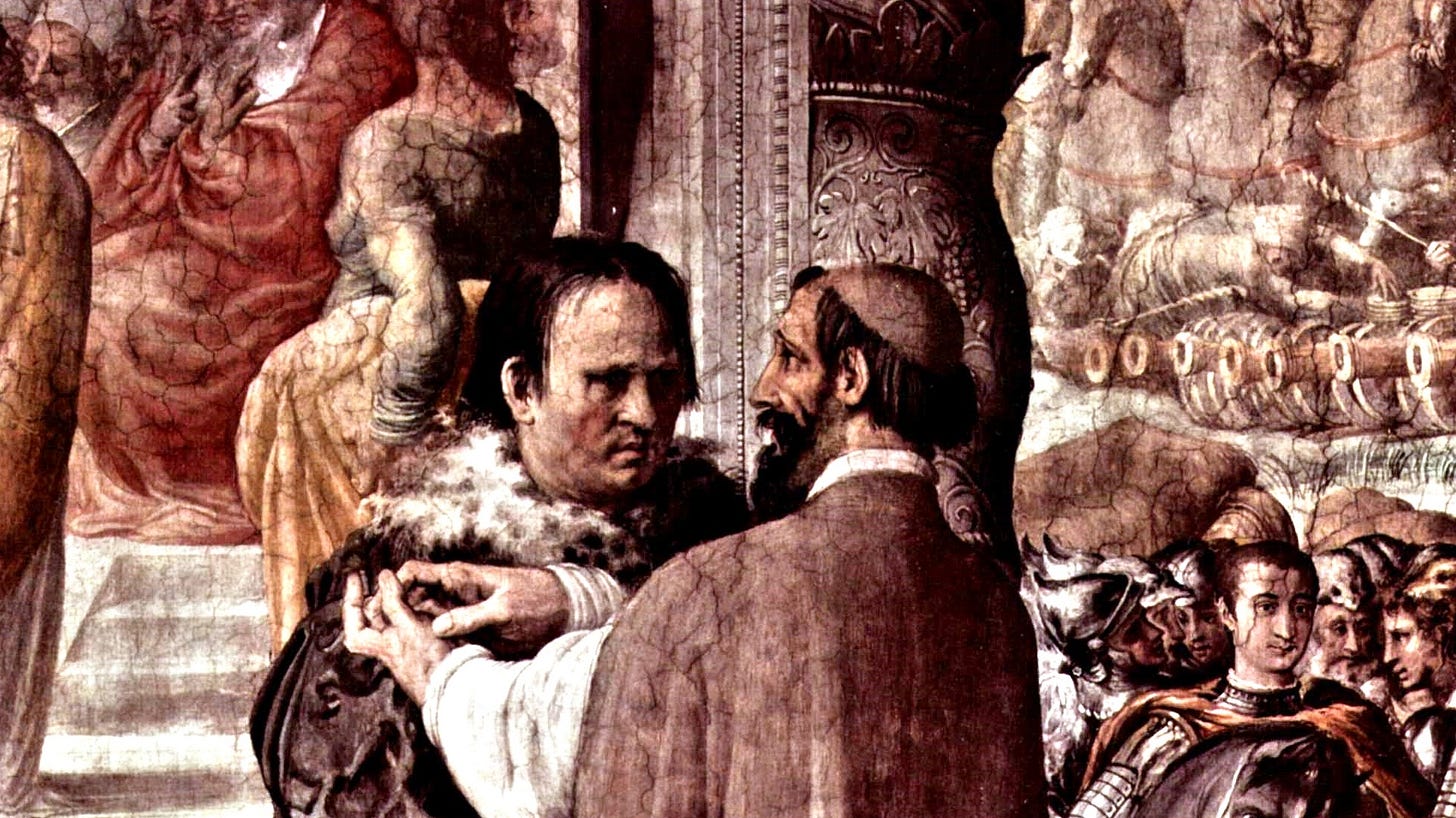Recognising heretics "... according to the Mind of St Alphonsus" – Scavini, 1869
"Whoever delights in such novelties, I deduce from this fact alone that he is a heretic."

Editors’ Notes
The following texts are taken from Pietro (or “Petro”) Scavini’s work, Theologia moralis universa ad mentem S. Alphonsi (The whole of moral theology according to the mind of St Alphonsus).
Scavini was an Italian moral theologian an seminary teacher who lived 1791-1869.
His general faithfulness to St Alphonsus was disputed and defended respectively, but this is not important here. Even aside from this question, the two sections we are publishing bear witness against a false idea.
That ideas is that Catholic theology holds that heresy cannot be recognised without an authoritative declaration from authority.
This first part contains three “rules“ by which one may recognise heretics.
The next part, which comes before it in the text, contains Scavini’s treatment of when the duty to denounce someone as a heretic applies.
But what is the use of rules for recognising heretics, if we already know that all heretics who deny their state are merely occult until declared otherwise by authority?
And can one denounce someone as a heretic – as opposed to merely suspect of heresy – without first recognising that he is a heretic?
On the contrary, the texts presume throughout that one may know someone to be a heretic prior to such a declaration, and give the lie to such facile claims.
Not that all heretics can be recognised as such, of course. That is not the point.
In this piece, Borgo’s text in Point B recalls that of St Pius X in Pascendi, which seems, inexplicably, to have been forgotten by those who seem confused by the occasional orthodox or traditional acts in this period:
“In the writings and addresses they seem not unfrequently to advocate now one doctrine now another so that one would be disposed to regard them as vague and doubtful. But there is a reason for this, and it is to be found in their ideas as to the mutual separation of science and faith.
“Hence in their books you find some things which might well be expressed by a Catholic, but in the next page you find other things which might have been dictated by a rationalist.” (n. 18)
Theologia Moralis Universa – ad mentem S. Alphonsi M. De Ligorio
Petro Scavini
Liber Secundus
Mediolani: Apud Ernestum Oliva edit.-Bibliop, 1889
pp. 646-648
Translated by a friend of The WM Review. We have added some line breaks and headings for readability.
Q: What are the rules for recognizing heretics?
A: If the art of recognizing heretics and distinguishing them from true Catholics has always been very useful, it is certainly most useful in our age and especially in our time, when it is well known to all what impious schemes some have for leading the Italian people to the views of the Protestants. But as much as it is useful, it is also difficult; since their character is discoloured and accustomed to feed in long shadows.
There are indeed some whose whole effort is to make themselves esteemed as good people in order to deceive others more easily: they outwardly display the utmost purity of morals; they preach stricter moral doctrines; they love to publish wonderful things about themselves concerning their genius, erudition, and all kinds of knowledge; they want to appear holy even to the point of displaying ostentatious miracles.
Among the disciples of the Jansenist heretics, this character is seen in Paris. Yet their inner character is that of ravenous wolves. On the other hand, others openly disregard the esteem of the good and associate themselves with the worst people, in order to make them more easily their disciples and ministers of their errors.
Three Rules
Nevertheless, there are certain rules, the first of which, general and certain, Christ has given us:
“By their fruits you will know them: do men gather grapes from thorns, or figs from thistles? A good tree cannot bear bad fruit, nor can a bad tree bear good fruit.”
However, the particular and conjectural rules are as follows:
A) Love of Novelty
First, perhaps the greatest of all, is the love of novelty concerning religious doctrines; namely, wanting to preach new things, publish them in print, hand them down to the young, and spread them among the Christian people.
History teaches us that this has been the practice of almost all heretics: thus, to omit others, it is read of John Huss, from whom the Hussites are named, that he always loved strange and new opinions.
The love of novelty, for the most part, can easily be seen even in those who use words never before heard in the school; therefore the Apostle admonished Timothy: “O Timothy, keep that which is committed to thy trust, avoiding the profane novelties of words, and oppositions of knowledge falsely so called.”
The African fathers also wrote to Pope Thebes: “It is known that such novelties of discourse arise from a love of glory, when they wish to appear acute, perspicacious, and wise, seeking what new thing they can bring forth.”
And Alphonsus de Castro said: “Whoever delights in such novelties, and eagerly seeks them out, in order to captivate empty glory, I deduce from this fact alone that he is a heretic, or at least inclined to heresy and likely to fall into it easily.”
B) Excessive liberty with matters of faith
Another rule is an excessive freedom in pronouncing on matters of faith and Christian doctrine, whatever comes into one's mouth; and the fact that reckless imprudence in defining reveals itself as temerity, is supported by pride, and increases obstinacy, and thus finally, obstinacy joined to error makes one a heretic.
This pertains to what we read in the Bull Auctorem Fidei:
"The boldness of affirming and denying, and fighting for his own opinion, has always been the fraudulent cunning of the Innovators for the circumvention of error."
Also, what Borgo relates pertains to this:
"It is fitting to mention a very common malice of heretics and especially of those vile and cowardly ones who lack the honesty to fully express what they think, such as (and most of all) the Jansenists.
“When they want to insinuate a more repugnant error, they break it into pieces and scatter them here and there in their writings; they make others drink the poison in sips, causing less harm to the unwary.
“But those who thoroughly understand the wicked design know well how to gather and bring together the scattered limbs of the monster; then, what simple readers feel is the wholesome disgust and horror due to heretical doctrine."
C) Anger
The third rule is that is almost universally characteristic of all heretics that if anyone kindly warns them of their error, they quickly boil with anger, return curses for benefits, rave with abuse and insults against the admonisher, and in no way allow themselves to be taught.
We have an example of this in Luther, easily the prince of the innovators: when at the beginning of his errors he was kindly warned by learned men, instead of correcting himself, he fell even more furiously; when corrected most kindly by Pope Leo X, he openly began to rage against him, and so, with one abyss calling upon another, he finally descended into the depths.
HELP KEEP THE WM REVIEW ONLINE!
As we expand The WM Review we would like to keep providing free articles for everyone. If you have benefitted from our content please do consider supporting us financially.
A subscription from you helps ensure that we can keep writing and sharing free material for all.
Plus, you will get access to our exclusive members-only material!
Thank you!




Thank you for this. The three rules certainly apply to sedevacantists because a) the belief is novel, b) they have made their own personal belief into a doctrine, and c) if you try to charitably correct them they get irate, angry and accuse you of being a heretic.